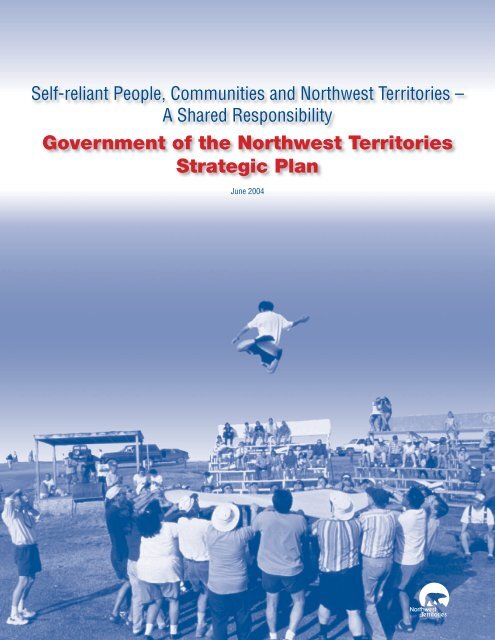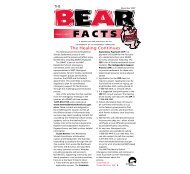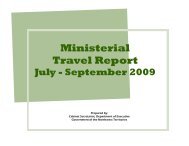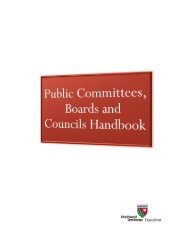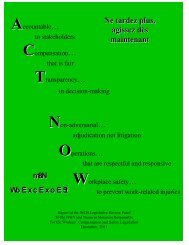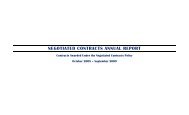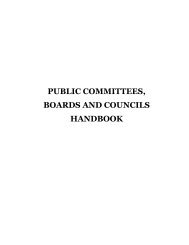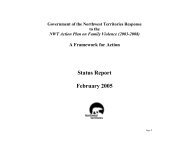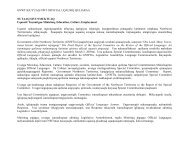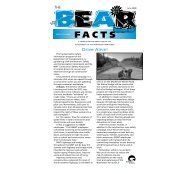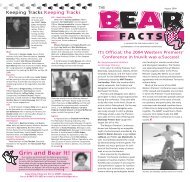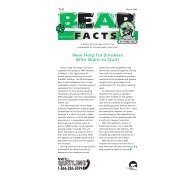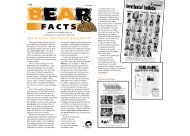Government of the Northwest Territories Strategic Plan
Government of the Northwest Territories Strategic Plan
Government of the Northwest Territories Strategic Plan
You also want an ePaper? Increase the reach of your titles
YUMPU automatically turns print PDFs into web optimized ePapers that Google loves.
Self-reliant People, Communities and <strong>Northwest</strong> <strong>Territories</strong> –<br />
A Shared Responsibility<br />
<strong>Government</strong> <strong>of</strong> <strong>the</strong> <strong>Northwest</strong> <strong>Territories</strong><br />
<strong>Strategic</strong> <strong>Plan</strong><br />
June 2004
SELF-RELIANT PEOPLE, COMMUNITIES AND NORTHWEST TERRITORIES – A SHARED RESPONSIBILITY<br />
Table <strong>of</strong> Contents<br />
Message from <strong>the</strong> Premier ........................................................................................................................................... 1<br />
Introduction..................................................................................................................................................................... 3<br />
A Vision and Goals for <strong>the</strong> <strong>Northwest</strong> <strong>Territories</strong>........................................................................................................... 3<br />
The <strong>Strategic</strong> <strong>Plan</strong> – Setting <strong>the</strong> Broad Direction ......................................................................................................... 3<br />
The Link to Departmental Business <strong>Plan</strong>s..................................................................................................................... 3<br />
A Living Document ....................................................................................................................................................... 3<br />
Where We are Today - Opportunities and Challenges .............................................................................................. 4<br />
Our Natural Environment ............................................................................................................................................. 4<br />
Our Health, Social and Cultural Well-being .................................................................................................................. 4<br />
Our System <strong>of</strong> Governance ........................................................................................................................................... 5<br />
The Economy ............................................................................................................................................................... 5<br />
The Fiscal Picture ......................................................................................................................................................... 6<br />
The Vision <strong>of</strong> <strong>the</strong> 15th Legislative Assembly ............................................................................................................. 7<br />
Goals and Expected Results ........................................................................................................................................ 7<br />
Priorities ......................................................................................................................................................................... 8<br />
Core Values ..................................................................................................................................................................... 9<br />
Shared Responsibility at a Glance ............................................................................................................................. 10<br />
Actions ........................................................................................................................................................................... 11<br />
Goal 1......................................................................................................................................................................... 11<br />
Goal 2......................................................................................................................................................................... 12<br />
Goal 3......................................................................................................................................................................... 13<br />
Goal 4......................................................................................................................................................................... 14<br />
Goal 5......................................................................................................................................................................... 15<br />
<strong>Government</strong> <strong>of</strong> <strong>the</strong> <strong>Northwest</strong> <strong>Territories</strong> – <strong>Strategic</strong> <strong>Plan</strong><br />
i
SELF-RELIANT PEOPLE, COMMUNITIES AND NORTHWEST TERRITORIES – A SHARED RESPONSIBILITY<br />
Message from <strong>the</strong> Premier<br />
When <strong>the</strong> 15th<br />
Legislative Assembly<br />
came into <strong>of</strong>fice in<br />
December 2003, we<br />
made a commitment<br />
to find new ways <strong>of</strong><br />
doing business. We<br />
agreed to work toge<strong>the</strong>r<br />
to find ways <strong>of</strong> making<br />
consensus government<br />
stronger and more<br />
responsive to <strong>the</strong> needs <strong>of</strong> <strong>the</strong> people <strong>of</strong> <strong>the</strong> <strong>Northwest</strong><br />
<strong>Territories</strong>. We also agreed to work in partnership with<br />
o<strong>the</strong>r governments in <strong>the</strong> <strong>Northwest</strong> <strong>Territories</strong> to build an<br />
agenda that has a broad base <strong>of</strong> support throughout <strong>the</strong><br />
territory.<br />
For <strong>the</strong> past six months, we have listened to leaders and<br />
residents <strong>of</strong> <strong>the</strong> <strong>Northwest</strong> <strong>Territories</strong> about <strong>the</strong> issues and<br />
priorities that <strong>the</strong>y believe are important to our territory.<br />
We have been guided by <strong>the</strong> input <strong>of</strong> <strong>the</strong> Members <strong>of</strong> <strong>the</strong><br />
Legislative Assembly, through <strong>the</strong> Standing Committee on<br />
Accountability and Oversight, who have provided timely<br />
and important advice.<br />
This <strong>Strategic</strong> <strong>Plan</strong> is based upon <strong>the</strong> vision and goals<br />
for <strong>the</strong> 15th Legislative Assembly, jointly developed<br />
by all Members. It sets out <strong>the</strong> initial direction for <strong>the</strong><br />
<strong>Government</strong> <strong>of</strong> <strong>the</strong> <strong>Northwest</strong> <strong>Territories</strong> for <strong>the</strong> next 10<br />
years.<br />
The GNWT’s <strong>Strategic</strong> <strong>Plan</strong> represents a starting point in<br />
our ongoing discussions with <strong>the</strong> people <strong>of</strong> <strong>the</strong> <strong>Northwest</strong><br />
<strong>Territories</strong>. The <strong>Strategic</strong> <strong>Plan</strong> will change and evolve<br />
as we move forward to build an agenda that has broad<br />
support throughout our territory, by engaging <strong>the</strong> people<br />
<strong>of</strong> <strong>the</strong> <strong>Northwest</strong> <strong>Territories</strong> and o<strong>the</strong>r nor<strong>the</strong>rn leaders<br />
through forums such as <strong>the</strong> Circle <strong>of</strong> Nor<strong>the</strong>rn Leaders.<br />
We look forward to continuing to work with our partners<br />
to build a strong, vibrant and self-reliant territory.<br />
Premier Joseph Handley<br />
<strong>Government</strong> <strong>of</strong> <strong>the</strong> <strong>Northwest</strong> <strong>Territories</strong> – <strong>Strategic</strong> <strong>Plan</strong> 1
SELF-RELIANT PEOPLE, COMMUNITIES AND NORTHWEST TERRITORIES – A SHARED RESPONSIBILITY<br />
Introduction<br />
The phrase “Self-reliant people, communities and <strong>Northwest</strong> <strong>Territories</strong> – a shared responsibility” captures<br />
<strong>the</strong> spirit <strong>of</strong> this 10-year government-wide strategic plan. It points out that we must each do our part – as individuals,<br />
families, communities, governments, and collectively as a territory – if we are going to improve <strong>the</strong> lives <strong>of</strong> Nor<strong>the</strong>rners<br />
and achieve self-reliance.<br />
A Vision and Goals for <strong>the</strong> <strong>Northwest</strong> <strong>Territories</strong><br />
The 15th Legislative Assembly has adopted a vision<br />
and goals, which focus on self-reliance and shared<br />
responsibility. They create a sense <strong>of</strong> optimism and<br />
confidence that toge<strong>the</strong>r we can build a vibrant <strong>Northwest</strong><br />
<strong>Territories</strong> – one that we can all be proud <strong>of</strong>.<br />
The <strong>Strategic</strong> <strong>Plan</strong> – Setting <strong>the</strong> Broad Direction<br />
Guided by this vision and goals, <strong>the</strong> <strong>Government</strong> <strong>of</strong><br />
<strong>the</strong> <strong>Northwest</strong> <strong>Territories</strong> has prepared this <strong>Strategic</strong><br />
<strong>Plan</strong>. It sets out broad direction for government by<br />
listing priorities and actions in support <strong>of</strong> <strong>the</strong> goals <strong>of</strong><br />
<strong>the</strong> Legislative Assembly. Underlying <strong>the</strong>se priorities<br />
and actions are a set <strong>of</strong> core values supported by <strong>the</strong><br />
<strong>Government</strong> <strong>of</strong> <strong>the</strong> <strong>Northwest</strong> <strong>Territories</strong>. These values are<br />
ones that we encourage members <strong>of</strong> <strong>the</strong> public service to<br />
embrace and uphold, and <strong>the</strong>y should be reflected in <strong>the</strong><br />
work that we do on behalf <strong>of</strong> <strong>the</strong> people <strong>of</strong> <strong>the</strong> <strong>Northwest</strong><br />
<strong>Territories</strong>.<br />
A Living Document<br />
This <strong>Strategic</strong> <strong>Plan</strong> lays out priorities and actions for <strong>the</strong><br />
<strong>Government</strong> <strong>of</strong> <strong>the</strong> <strong>Northwest</strong> <strong>Territories</strong> for <strong>the</strong> next 10<br />
years. Some <strong>of</strong> our priority initiatives will be completed<br />
during <strong>the</strong> term <strong>of</strong> <strong>the</strong> 15th Legislative Assembly. O<strong>the</strong>rs<br />
may begin to show results in this period, yet <strong>the</strong> benefits<br />
<strong>of</strong> some initiatives may only be fully realized during <strong>the</strong><br />
10-year planning time frame.<br />
This plan is not carved in stone, but should be treated as<br />
a living document. The actions described in this plan will<br />
change as our operating environment changes and as we<br />
work with nor<strong>the</strong>rn leaders and <strong>the</strong> public. As we monitor<br />
results, we need to remain open to changing our course <strong>of</strong><br />
action to achieve <strong>the</strong> desired outcomes.<br />
The Link to Departmental Business <strong>Plan</strong>s<br />
The core values, priorities and actions described in this<br />
plan are intended to show where we are headed. Along<br />
with <strong>the</strong> vision, goals and expected results <strong>of</strong> <strong>the</strong> 15th<br />
Legislative Assembly, <strong>the</strong>se values, priorities and actions<br />
will provide direction to departments in <strong>the</strong> development<br />
<strong>of</strong> detailed business plans. These departmental business<br />
plans will be reviewed and enhanced to ensure a direct<br />
link to <strong>the</strong> <strong>Strategic</strong> <strong>Plan</strong>. Results measures will be<br />
developed for both this plan and for business plans,<br />
which will allow all residents to better evaluate our<br />
success.<br />
<strong>Government</strong> <strong>of</strong> <strong>the</strong> <strong>Northwest</strong> <strong>Territories</strong> – <strong>Strategic</strong> <strong>Plan</strong> 3
SELF-RELIANT PEOPLE, COMMUNITIES AND NORTHWEST TERRITORIES – A SHARED RESPONSIBILITY<br />
Where We are Today - Opportunities and Challenges<br />
Our Natural Environment<br />
The connection that Aboriginal peoples have to <strong>the</strong><br />
land is an important part <strong>of</strong> <strong>the</strong>ir cultures. In fact, it has<br />
been only 30 years since <strong>the</strong> wage economy became<br />
a reality for nor<strong>the</strong>rn Aboriginal peoples. We are lucky<br />
to still have elders who can tell stories about living on<br />
<strong>the</strong> land. This body <strong>of</strong> traditional knowledge adds to<br />
scientific knowledge about <strong>the</strong> land and environment. It is<br />
becoming increasingly important, as large-scale resource<br />
development and global warming change our landscapes<br />
and climate patterns.<br />
We are blessed with marketable resources. The diverse<br />
nor<strong>the</strong>rn landscapes and wildlife attract adventurers from<br />
across <strong>the</strong> world who want to experience <strong>the</strong> raw beauty<br />
<strong>of</strong> nor<strong>the</strong>rn lakes, boreal plains and forests, wildlife and<br />
<strong>the</strong> Arctic Ocean. Recreational use <strong>of</strong> <strong>the</strong> environment<br />
brings adventure not only for tourists but also for many<br />
Nor<strong>the</strong>rners who hunt and fish to add to <strong>the</strong> food <strong>the</strong>y<br />
purchase in stores.<br />
Over <strong>the</strong> years, however, <strong>the</strong> traditional use <strong>of</strong> <strong>the</strong> land has<br />
competed with <strong>the</strong> demands <strong>of</strong> large-scale development.<br />
Fragile nor<strong>the</strong>rn ecosystems are suffering from <strong>the</strong><br />
combined effects <strong>of</strong> development and pollution on wildlife<br />
and species at risk. Pollution, much <strong>of</strong> which originates<br />
from sources outside <strong>of</strong> <strong>the</strong> <strong>Northwest</strong> <strong>Territories</strong>, shows<br />
up in nor<strong>the</strong>rn food chains. Contaminated sites, such<br />
as Giant Mine, need to be cleaned up. The effects <strong>of</strong><br />
global warming have become a reality in <strong>the</strong> north. This<br />
negatively affects our transportation infrastructure and<br />
harvesting patterns. <strong>Government</strong>s and industry have a<br />
responsibility to avoid <strong>the</strong> errors <strong>of</strong> <strong>the</strong> past and to protect<br />
<strong>the</strong> environment.<br />
Pollutants and large-scale resource development are<br />
not <strong>the</strong> only factors placing a strain on our fragile<br />
ecology. Nor<strong>the</strong>rners are consumers <strong>of</strong> resources in<br />
large quantities. We each need to do our part to conserve<br />
energy and use only what we need. It is everyone’s<br />
responsibility to exercise care and to make sure that <strong>the</strong><br />
land and environment are protected for present and future<br />
generations to enjoy.<br />
Our Health, Social and Cultural Well-being<br />
Physical, spiritual and social well-being is necessary for<br />
individuals to lead fulfilling lives, to actively participate<br />
in <strong>the</strong>ir communities and to take advantage <strong>of</strong> economic<br />
opportunities available to <strong>the</strong>m. All children deserve to<br />
grow up in enriching, safe and loving environments.<br />
They rely on <strong>the</strong>ir parents and family, <strong>the</strong> community,<br />
society, and governments to make that happen. Expectant<br />
mo<strong>the</strong>rs need to make healthy and responsible choices<br />
leading to good prenatal care. Children should be raised<br />
with love and a respect for language, culture and o<strong>the</strong>r<br />
people; educated in schools that teach relevant skills;<br />
nurtured when <strong>the</strong>y are sick; provided with food, shelter<br />
and clothing; and taught to be self-reliant and to live with<br />
dignity.<br />
On <strong>the</strong> positive side, living conditions for Nor<strong>the</strong>rners<br />
have improved over <strong>the</strong> years. Communities and regions<br />
are beginning to take ownership <strong>of</strong> <strong>the</strong> social well-being<br />
<strong>of</strong> <strong>the</strong>ir residents. The challenges <strong>of</strong> delivering quality<br />
health programs in remote communities has led to new<br />
ideas such as <strong>the</strong> successful diabetes program, which was<br />
developed by Nor<strong>the</strong>rners for Nor<strong>the</strong>rners. Unlike in o<strong>the</strong>r<br />
parts <strong>of</strong> <strong>the</strong> world, where different cultures are at war with<br />
one ano<strong>the</strong>r, our children grow up in culturally diverse<br />
communities, learning first-hand about mutual respect,<br />
tolerance and acceptance.<br />
However, <strong>the</strong> <strong>Northwest</strong> <strong>Territories</strong> continues to deal with<br />
serious issues. Far too many Nor<strong>the</strong>rners continue to<br />
make unhealthy choices. There are too many people who<br />
smoke, drink excessively, and suffer from addictions. Too<br />
many women and children are victims <strong>of</strong> family violence.<br />
Rates <strong>of</strong> physical activity among NWT residents are lower<br />
than national averages. This, and unhealthy eating habits,<br />
can have negative effects on personal health and<br />
well-being.<br />
4<br />
<strong>Government</strong> <strong>of</strong> <strong>the</strong> <strong>Northwest</strong> <strong>Territories</strong> – <strong>Strategic</strong> <strong>Plan</strong>
SELF-RELIANT PEOPLE, COMMUNITIES AND NORTHWEST TERRITORIES – A SHARED RESPONSIBILITY<br />
We need to focus more on promoting healthy lifestyles,<br />
on preventing illnesses and on individuals taking<br />
responsibility for <strong>the</strong>ir health and well-being. We need<br />
to increase women’s participation in <strong>the</strong> political, social,<br />
economic, and cultural growth <strong>of</strong> <strong>the</strong> NWT. We need to<br />
ensure that our resources are used in <strong>the</strong> best possible<br />
ways to achieve good results. We also need to attract and<br />
retain a stable front line workforce that can provide <strong>the</strong><br />
right services, at <strong>the</strong> right time and place.<br />
As is <strong>the</strong> case elsewhere in Canada, <strong>the</strong>re is still a big<br />
gap between <strong>the</strong> education levels, health and housing<br />
conditions and employment rates for Aboriginal and<br />
non-Aboriginal populations. The continuing shortage <strong>of</strong><br />
affordable, suitable and adequate housing, both in smaller<br />
communities and larger centres, does little to assist<br />
people to meet <strong>the</strong>ir basic needs for shelter.<br />
Creating an environment that supports healthy people<br />
is truly a shared responsibility and requires each <strong>of</strong><br />
us to do our part. This means that governments must<br />
deliver effective public policies and adequate resources<br />
to support social programs. It means that communities<br />
should support individual members to achieve healthy<br />
lifestyles and behaviour. It also means that families and<br />
individuals must make healthy lifestyle choices – good<br />
prenatal care, staying in school, healthy eating, active<br />
living, and no smoking, drinking, drugs or violence.<br />
Our System <strong>of</strong> Governance<br />
The way we govern ourselves says a lot about who we are<br />
as a people. Our rich cultural diversity, combined with our<br />
history, has led to a unique and fairly complex system <strong>of</strong><br />
governance. While <strong>the</strong> implementation <strong>of</strong> self-government<br />
agreements will add to <strong>the</strong> complexity <strong>of</strong> <strong>the</strong> system, it<br />
is important to <strong>the</strong> achievement <strong>of</strong> Aboriginal peoples’<br />
aspirations. It is also a critical step toward building a solid<br />
foundation for <strong>the</strong> territories’ political, social, cultural, and<br />
economic development.<br />
Aboriginal residents are asking <strong>the</strong>ir leaders to establish<br />
self-governments in <strong>the</strong> <strong>Northwest</strong> <strong>Territories</strong>. At <strong>the</strong><br />
same time, citizens generally are lobbying to have<br />
decision-making closer to home and are expecting <strong>the</strong>ir<br />
governments to be more accountable, transparent and<br />
capable <strong>of</strong> delivering quality programs.<br />
This has brought nor<strong>the</strong>rn leaders toge<strong>the</strong>r, signifying an<br />
historic first step toward developing common ground and<br />
working toge<strong>the</strong>r toward improving <strong>the</strong> quality <strong>of</strong> life <strong>of</strong><br />
Nor<strong>the</strong>rners. This progress has been marked by an April<br />
2004 commitment by nor<strong>the</strong>rn leaders to work toge<strong>the</strong>r on<br />
an overall agenda for <strong>the</strong> NWT.<br />
The challenges ahead are tremendous, but <strong>the</strong>y can be<br />
overcome if all leaders continue to work toge<strong>the</strong>r. Our<br />
system <strong>of</strong> governance will change with <strong>the</strong> implementation<br />
<strong>of</strong> self-government, devolution and more responsibility<br />
for municipal governments. As this happens, it will be<br />
important to make sure that all levels <strong>of</strong> government have<br />
enough capacity to deliver quality programs and that<br />
governments are accountable for <strong>the</strong> actions <strong>the</strong>y take.<br />
The Economy<br />
The <strong>Northwest</strong> <strong>Territories</strong> is blessed with an abundance<br />
<strong>of</strong> resources. These support an economy, which is largely<br />
based on diamonds, gas, oil, gold, and o<strong>the</strong>r minerals.<br />
We are home to <strong>the</strong> only two commercially producing<br />
diamond mines in North America, with a third in <strong>the</strong><br />
planning stages. Diamond production for 2003 was<br />
$1.7 billion, representing 12% <strong>of</strong> global diamond<br />
production, making <strong>the</strong> NWT <strong>the</strong> third largest producer <strong>of</strong><br />
rough diamonds by value in <strong>the</strong> world.<br />
<strong>Government</strong> <strong>of</strong> <strong>the</strong> <strong>Northwest</strong> <strong>Territories</strong> – <strong>Strategic</strong> <strong>Plan</strong> 5
SELF-RELIANT PEOPLE, COMMUNITIES AND NORTHWEST TERRITORIES – A SHARED RESPONSIBILITY<br />
The <strong>Northwest</strong> <strong>Territories</strong> has huge oil and gas reserves,<br />
enabling <strong>the</strong> NWT and Canada to supply secure energy to<br />
North American markets. There are an estimated 6 trillion<br />
cubic feet <strong>of</strong> discovered gas reserves and an additional<br />
55 trillion cubic feet <strong>of</strong> likely gas reserves within <strong>the</strong><br />
Mackenzie Delta/Beaufort Sea region.<br />
Opportunities also exist in forestry, fishing, fur harvesting,<br />
and hydro-electricity. The <strong>Northwest</strong> <strong>Territories</strong> has<br />
<strong>the</strong> potential to generate more hydro-electric power<br />
than James Bay or Churchill Falls, using modern<br />
technology that will limit environmental impacts. And,<br />
while renewable resource industries are relatively minor<br />
in terms <strong>of</strong> <strong>the</strong> territories’ cash economy, <strong>the</strong>y remain<br />
important as a source <strong>of</strong> food and for maintaining our<br />
nor<strong>the</strong>rn cultures and lifestyles. About 40% <strong>of</strong> territorial<br />
residents over 15 years <strong>of</strong> age spend time on <strong>the</strong> land<br />
hunting or fishing.<br />
The tourism industry in <strong>the</strong> <strong>Northwest</strong> <strong>Territories</strong> was<br />
worth $44 million in 2002. With lots <strong>of</strong> room to grow, new<br />
opportunities are developing for Aboriginal and cultural<br />
tourism that will promote unique cultural experiences.<br />
Improvements and expansions to our transportation<br />
infrastructure are key to making this happen.<br />
While <strong>the</strong> <strong>Northwest</strong> <strong>Territories</strong> has a wealth <strong>of</strong> resources,<br />
a resource-based economy is dependent upon market<br />
forces outside its control. It is, <strong>the</strong>refore, vulnerable to<br />
boom and bust cycles. Diversifying <strong>the</strong> economy and<br />
maximizing benefits to Nor<strong>the</strong>rners from o<strong>the</strong>r sectors<br />
is a key priority <strong>of</strong> <strong>the</strong> <strong>Government</strong> <strong>of</strong> <strong>the</strong> <strong>Northwest</strong><br />
<strong>Territories</strong>.<br />
The Fiscal Picture<br />
An important responsibility <strong>of</strong> <strong>the</strong> <strong>Government</strong> <strong>of</strong> <strong>the</strong><br />
<strong>Northwest</strong> <strong>Territories</strong> is to ensure that Nor<strong>the</strong>rners<br />
benefit from <strong>the</strong> development <strong>of</strong> nor<strong>the</strong>rn resources<br />
and that economic development is sustainable and<br />
environmentally responsible. Both federal and territorial<br />
governments need to make strategic investments: in<br />
Nor<strong>the</strong>rners, to ensure <strong>the</strong>y have <strong>the</strong> skills to seize<br />
<strong>the</strong> economic opportunities; in infrastructure; in small<br />
business and industry; and in <strong>the</strong> regulatory processes<br />
established to ensure responsible resource development.<br />
A dilemma for <strong>the</strong> GNWT is that it does not have <strong>the</strong><br />
revenues to make those needed investments. Despite<br />
our goal to provide affordable public services, revenue<br />
growth is not keeping pace with our expenses. To<br />
avoid burdening future generations with a huge debt,<br />
expenditure growth will have to be reduced and additional<br />
revenues will need to be raised. The challenge will be to<br />
protect basic services and ensure that social well-being is<br />
not compromised, while making needed investments now<br />
to secure future fiscal and economic gains.<br />
The GNWT’s options for securing additional revenues are<br />
limited. The high cost <strong>of</strong> providing basic public services<br />
in <strong>the</strong> north means that NWT taxpayers cannot generate<br />
all <strong>of</strong> <strong>the</strong> revenues necessary to fund <strong>the</strong>se programs and<br />
services. As well, NWT tax rates must remain competitive<br />
with o<strong>the</strong>r provinces. Making matters worse is <strong>the</strong> fact<br />
that, under <strong>the</strong> current fiscal arrangement, <strong>the</strong> GNWT<br />
does not benefit from <strong>the</strong> royalties or taxes generated by<br />
<strong>the</strong> major resource operations in <strong>the</strong> NWT. At <strong>the</strong> same<br />
time, <strong>the</strong>se large-scale developments place extraordinary<br />
demands on infrastructure and social programs that <strong>the</strong><br />
GNWT is required to fund. While devolution and resource<br />
revenue sharing negotiations with <strong>the</strong> federal and<br />
Aboriginal governments are underway, <strong>the</strong>se are not likely<br />
to yield revenues to <strong>the</strong> NWT before 2007.<br />
Without a fair share <strong>of</strong> resource revenues, <strong>the</strong> GNWT will<br />
continue to depend on <strong>the</strong> federal government for<br />
75 per cent <strong>of</strong> its revenues. It is for this reason that<br />
formula financing discussions, involving adequacy <strong>of</strong><br />
federal/territorial funding arrangements, will continue to<br />
be a key priority <strong>of</strong> <strong>the</strong> GNWT.<br />
6<br />
<strong>Government</strong> <strong>of</strong> <strong>the</strong> <strong>Northwest</strong> <strong>Territories</strong> – <strong>Strategic</strong> <strong>Plan</strong>
SELF-RELIANT PEOPLE, COMMUNITIES AND NORTHWEST TERRITORIES – A SHARED RESPONSIBILITY<br />
The Vision <strong>of</strong> <strong>the</strong> 15th Legislative Assembly<br />
This vision describes <strong>the</strong> future we are working towards and what we hope to accomplish:<br />
Self-reliant individuals and families sharing <strong>the</strong> rewards and responsibilities<br />
<strong>of</strong> healthy communities and a prosperous and unified <strong>Northwest</strong> <strong>Territories</strong><br />
Goals and Expected Results (not listed in any particular order)<br />
Goal 1<br />
A strong nor<strong>the</strong>rn voice and identity.<br />
This means…<br />
• All NWT leaders working toge<strong>the</strong>r with mutual trust<br />
and respect.<br />
• NWT indigenous cultures and languages that are a<br />
source <strong>of</strong> strength for present and future generations.<br />
• Successful negotiation and implementation <strong>of</strong><br />
Aboriginal land, resource, and self-government<br />
agreements in all regions.<br />
• The <strong>Northwest</strong> <strong>Territories</strong> being a full partner, and<br />
having a strong, unified voice in <strong>the</strong> Canadian<br />
federation.<br />
• Adequate resources available to support operations <strong>of</strong><br />
and investments by nor<strong>the</strong>rn governments.<br />
Goal 2<br />
Healthy, educated people living in safe<br />
communities, who are able to contribute and<br />
take advantage <strong>of</strong> life’s opportunities.<br />
This means…<br />
• Babies who are born healthy and become healthy<br />
adults.<br />
• Children getting <strong>the</strong> care and nurturing <strong>the</strong>y need.<br />
• Youth, parents and adults who see wellness as <strong>the</strong><br />
preferred alternative, and who make healthy and<br />
productive lifestyle choices for <strong>the</strong>mselves and <strong>the</strong>ir<br />
families.<br />
• Elders and persons with disabilities who are well,<br />
supported by <strong>the</strong>ir families and community, and able<br />
to live with dignity.<br />
• Housing that is adequate, affordable and accessible.<br />
Goal 3<br />
Well-governed, sustainable communities and<br />
regions able to fulfill <strong>the</strong>ir potential.<br />
This means…<br />
• Community and regional goals are achieved by<br />
cooperation and shared responsibility among all NWT<br />
governments.<br />
• All governments have clear, accountable and efficient<br />
governance structures.<br />
• Communities and regions having <strong>the</strong> capacity <strong>the</strong>y<br />
need to achieve <strong>the</strong>ir goals.<br />
Goal 4<br />
A diversified economy that provides<br />
Nor<strong>the</strong>rners with opportunities and choices.<br />
This means…<br />
• A traditional economy capable <strong>of</strong> creating and<br />
maintaining a good living and healthy lifestyle for<br />
those Nor<strong>the</strong>rners who choose to participate in it.<br />
• Renewable resource, small business and tourism<br />
ventures that are viable and sustainable in every<br />
community.<br />
• A balanced approach to <strong>the</strong> economic development <strong>of</strong><br />
all sectors that is sustainable over <strong>the</strong> long term.<br />
• Nor<strong>the</strong>rners being <strong>the</strong> primary beneficiaries <strong>of</strong> <strong>the</strong><br />
development <strong>of</strong> our resources.<br />
Goal 5<br />
Care and protection <strong>of</strong> <strong>the</strong> natural environment.<br />
This means…<br />
• Respect for <strong>the</strong> land, water and traditional knowledge<br />
guiding decisions <strong>of</strong> governments, industry and<br />
individuals.<br />
• Responsible, coordinated management <strong>of</strong> <strong>the</strong><br />
environment to protect <strong>the</strong> land, water and wildlife.<br />
• Resource development that balances economic<br />
benefits, social impacts and environmental<br />
preservation and protection.<br />
• <strong>Government</strong>s acting on <strong>the</strong>ir responsibilities to clean<br />
up contaminated environmental sites.<br />
• Responsible consumption and conservation <strong>of</strong><br />
resources and energy by all governments, industries<br />
and individuals.<br />
<strong>Government</strong> <strong>of</strong> <strong>the</strong> <strong>Northwest</strong> <strong>Territories</strong> – <strong>Strategic</strong> <strong>Plan</strong> 7
SELF-RELIANT PEOPLE, COMMUNITIES AND NORTHWEST TERRITORIES – A SHARED RESPONSIBILITY<br />
Priorities (not listed in any particular order)<br />
Priorities identify those areas selected as being <strong>of</strong> key importance during <strong>the</strong> life <strong>of</strong> this government. As with all <strong>of</strong> <strong>the</strong><br />
actions identified in <strong>the</strong> plan, individuals, families, communities, <strong>the</strong> private sector, and governments will need to work<br />
toge<strong>the</strong>r and do <strong>the</strong>ir part to make progress in each case.<br />
Priority 1<br />
Helping people help <strong>the</strong>mselves – our personal,<br />
family and community responsibilities<br />
• Educating ourselves – improving education levels for<br />
children and adults;<br />
• Meeting our housing needs – addressing housing<br />
shortages and homelessness;<br />
• Living healthy lifestyles – breaking addictions and<br />
making productive and healthy choices;<br />
• Supporting greater community autonomy –<br />
negotiating a new deal with community governments.<br />
Priority 2<br />
Negotiating fair deals with Canada<br />
and Aboriginal governments<br />
• Benefiting from <strong>the</strong> development <strong>of</strong> nor<strong>the</strong>rn<br />
resources – concluding fair devolution and resource<br />
revenue sharing agreements with Canada;<br />
• Concluding unfinished business – settling<br />
outstanding land, resources and self-government<br />
agreements; and<br />
• Negotiating, through <strong>the</strong> devolution process,<br />
authority for nor<strong>the</strong>rn governments over <strong>the</strong><br />
regulatory regime – establishing consistent standards<br />
and practices.<br />
Priority 3<br />
Focusing on our economy and infrastructure<br />
• Diversifying our economy – supporting small<br />
businesses, traditional economies, agriculture<br />
development and fisheries, and expanding our<br />
tourism sector;<br />
• Enhancing accessibility to markets – improving<br />
transportation and community infrastructure;<br />
• Reducing <strong>the</strong> cost <strong>of</strong> living in <strong>the</strong> north – finding ways<br />
to lower transportation, utility, communications, and<br />
land costs; and<br />
• Maximizing nor<strong>the</strong>rn benefits from <strong>the</strong> proposed<br />
pipeline – ensuring Nor<strong>the</strong>rners have <strong>the</strong> skills<br />
and take advantage <strong>of</strong> <strong>the</strong> economic opportunities<br />
associated with <strong>the</strong> construction <strong>of</strong> <strong>the</strong> Mackenzie<br />
Valley pipeline.<br />
Priority 4<br />
Environmental stewardship<br />
• Protecting our air, water, forest, and land – facilitating<br />
responsible development <strong>of</strong> non-renewable and<br />
renewable resources;<br />
• Building an efficient and effective energy sector –<br />
providing clean and affordable energy to nor<strong>the</strong>rn<br />
consumers and encouraging conservation; and<br />
• Remediating contaminated sites throughout <strong>the</strong><br />
NWT – encouraging <strong>the</strong> federal government to<br />
rehabilitate abandoned contaminated sites on<br />
federal land in a timely manner and to acceptable<br />
environmental standards.<br />
8<br />
<strong>Government</strong> <strong>of</strong> <strong>the</strong> <strong>Northwest</strong> <strong>Territories</strong> – <strong>Strategic</strong> <strong>Plan</strong>
SELF-RELIANT PEOPLE, COMMUNITIES AND NORTHWEST TERRITORIES – A SHARED RESPONSIBILITY<br />
Core Values<br />
These core values will guide <strong>the</strong> actions <strong>of</strong> <strong>the</strong> <strong>Government</strong> <strong>of</strong> <strong>the</strong> <strong>Northwest</strong> <strong>Territories</strong>.<br />
Self-reliance<br />
Nor<strong>the</strong>rn people, families and governments having<br />
<strong>the</strong> tools and resources <strong>the</strong>y need to function and live<br />
independently and to exercise self-determination.<br />
Partnership<br />
Working with o<strong>the</strong>rs to maximize our resources and<br />
potential and to achieve <strong>the</strong> best results for Nor<strong>the</strong>rners.<br />
Accountability<br />
Enhancing <strong>the</strong> fiscal responsibility, effectiveness and<br />
credibility <strong>of</strong> governments through openness and<br />
transparency.<br />
Respect<br />
Treating all residents with respect, dignity, compassion,<br />
and fairness, and having respect for <strong>the</strong> value <strong>of</strong> our<br />
natural environment.<br />
Identity<br />
Supporting <strong>the</strong> development <strong>of</strong> strong individual, cultural<br />
and territorial identities.<br />
Integrity<br />
Decision-making that is fair, balanced, transparent, and<br />
consistent, and a public service that continues to be<br />
pr<strong>of</strong>essional and impartial.<br />
<strong>Government</strong> <strong>of</strong> <strong>the</strong> <strong>Northwest</strong> <strong>Territories</strong> – <strong>Strategic</strong> <strong>Plan</strong> 9
SELF-RELIANT PEOPLE, COMMUNITIES AND NORTHWEST TERRITORIES – A SHARED RESPONSIBILITY<br />
Shared Responsibility at a Glance<br />
Society<br />
• Individual<br />
• Family<br />
• Community<br />
• Voluntary Sector<br />
• Non-governmental<br />
Organizations<br />
• Cultures and Identity<br />
• Spiritual<br />
Environment<br />
• Land<br />
• Water<br />
• Wildlife<br />
• Air<br />
Economy<br />
• Public Sector<br />
• Business<br />
• Industry<br />
<strong>Government</strong>s<br />
• Municipal<br />
• Aboriginal<br />
• Legislative Assembly<br />
• <strong>Government</strong> <strong>of</strong> Canada<br />
• Provinces and<br />
O<strong>the</strong>r <strong>Territories</strong><br />
10<br />
<strong>Government</strong> <strong>of</strong> <strong>the</strong> <strong>Northwest</strong> <strong>Territories</strong> – <strong>Strategic</strong> <strong>Plan</strong>
SELF-RELIANT PEOPLE, COMMUNITIES AND NORTHWEST TERRITORIES – A SHARED RESPONSIBILITY<br />
Actions<br />
The government has set out its priorities and what we want to focus on. The extent to which we can advance our priorities<br />
will depend, in part, on <strong>the</strong> resources we have available and <strong>the</strong> support we get from Members <strong>of</strong> <strong>the</strong> Legislative Assembly<br />
and nor<strong>the</strong>rn leaders.<br />
The government’s fiscal situation and strategy will affect how quickly <strong>the</strong> government can implement <strong>the</strong> actions identified<br />
here. We have long-term plans to increase our revenues and negotiate a better deal with Ottawa. If we are successful in<br />
implementing our fiscal strategy, we should be able to undertake <strong>the</strong>se actions within <strong>the</strong> next 10 years. Those actions that<br />
can be achieved during <strong>the</strong> life <strong>of</strong> this government will be reflected in detailed departmental business plans.<br />
Not all actions are new initiatives. Implementation <strong>of</strong> some actions is already underway. O<strong>the</strong>rs may require <strong>the</strong> redirection<br />
<strong>of</strong> existing resources, which will also be addressed in departmental business plans.<br />
Goal 1<br />
A strong nor<strong>the</strong>rn voice and identity<br />
Expected Results<br />
✓ All NWT leaders working toge<strong>the</strong>r with mutual trust and respect.<br />
✓ NWT indigenous cultures and languages that are a source <strong>of</strong> strength for present and future generations.<br />
✓ Successful negotiation and implementation <strong>of</strong> Aboriginal land, resource and self-government agreements in all<br />
regions.<br />
✓ The <strong>Northwest</strong> <strong>Territories</strong> being a full partner, and having a strong, unified voice in <strong>the</strong> Canadian federation.<br />
✓ Adequate resources available to support operations <strong>of</strong> and investments by nor<strong>the</strong>rn governments.<br />
Actions<br />
The <strong>Government</strong> <strong>of</strong> <strong>the</strong> <strong>Northwest</strong> <strong>Territories</strong> will:<br />
• Implement school programs to support culture and language, in partnership with families and communities.<br />
• Promote <strong>the</strong> NWT as a prime location to live, raise a family, visit and do business, and build on initiatives that<br />
promote and distinguish <strong>the</strong> NWT’s unique nor<strong>the</strong>rn identity.<br />
• Actively promote <strong>the</strong> interests <strong>of</strong> <strong>the</strong> NWT through its intergovernmental relations.<br />
• Work with nor<strong>the</strong>rn leaders to design and establish a nor<strong>the</strong>rn intergovernmental assembly and work jointly to<br />
develop a nor<strong>the</strong>rn agenda.<br />
• Work in partnership with Members <strong>of</strong> <strong>the</strong> Legislative Assembly to make consensus government strong and effective.<br />
• Continue to work with all regions and communities towards settling outstanding Aboriginal land, resources and selfgovernment<br />
agreements and implement those that have been finalized.<br />
• Work jointly with our nor<strong>the</strong>rn partners, Aboriginal governments and <strong>the</strong> federal government to build <strong>the</strong> capacity <strong>of</strong><br />
nor<strong>the</strong>rn governments, at all levels, to ensure <strong>the</strong> successful implementation <strong>of</strong> self-government.<br />
• Work in partnership with nor<strong>the</strong>rn leaders to negotiate a fair deal on devolution and resource revenue sharing and<br />
continue to develop positions jointly to project a strong and unified nor<strong>the</strong>rn voice.<br />
• Ensure that <strong>the</strong> general public is informed throughout <strong>the</strong> process <strong>of</strong> devolution, resource revenue sharing and selfgovernment<br />
negotiations.<br />
• Implement communications strategies to inform <strong>the</strong> public <strong>of</strong> <strong>the</strong> territorial government’s plans and to support our<br />
commitment to transparent and accountable government.<br />
• Expand partnerships and optimize federal contributions to economic and social development.<br />
• Make it a top priority to negotiate a more adequate formula financing agreement with <strong>the</strong> federal government.<br />
• Improve <strong>the</strong> GNWT’s fiscal position and performance, and avoid incurring levels <strong>of</strong> debt that we cannot afford.<br />
<strong>Government</strong> <strong>of</strong> <strong>the</strong> <strong>Northwest</strong> <strong>Territories</strong> – <strong>Strategic</strong> <strong>Plan</strong> 11
SELF-RELIANT PEOPLE, COMMUNITIES AND NORTHWEST TERRITORIES – A SHARED RESPONSIBILITY<br />
Goal 2<br />
Healthy, educated people living in safe communities,<br />
who are able to contribute and take advantage <strong>of</strong> life’s opportunities<br />
Expected Results<br />
✓ Babies who are born healthy and become healthy adults.<br />
✓ Children getting <strong>the</strong> care and nurturing <strong>the</strong>y need.<br />
✓ Youth, parents and adults who see wellness as <strong>the</strong> preferred alternative, and who make healthy and productive<br />
lifestyle choices for <strong>the</strong>mselves and <strong>the</strong>ir families.<br />
✓ Elders and persons with disabilities who are well, supported by <strong>the</strong>ir families and community, and able to live with<br />
dignity.<br />
✓ Housing that is adequate, affordable and accessible.<br />
Actions<br />
The <strong>Government</strong> <strong>of</strong> <strong>the</strong> <strong>Northwest</strong> <strong>Territories</strong> will:<br />
• Continue to provide programs to support healthy prenatal lifestyles, positive parenting skills, childcare and child<br />
development supports.<br />
• Support initiatives that encourage individuals, especially youths, to make positive lifestyle choices that improve<br />
health status and help avoid lifestyle-related diseases.<br />
• Support recreation and sport initiatives that provide opportunities for physical activity and personal development.<br />
• Implement a disabilities strategy.<br />
• Implement <strong>the</strong> use <strong>of</strong> nurse practitioners and midwives to complement <strong>the</strong> work <strong>of</strong> traditional health providers such<br />
as doctors, nurses and traditional healers.<br />
• Continue with <strong>the</strong> Seniors Action <strong>Plan</strong>, and o<strong>the</strong>r programs such as home care, to support elders living within <strong>the</strong>ir<br />
homes and communities wherever possible.<br />
• Implement student success initiatives to promote literacy and numeracy.<br />
• Increase educational choices at <strong>the</strong> high school level to improve links with vocational and work opportunities.<br />
• Focus adult training institutions to respond to labour market conditions and to support <strong>the</strong> use <strong>of</strong> career action plans.<br />
• Streng<strong>the</strong>n support for families in conflict by implementing <strong>the</strong> Protection Against Family Violence Act; developing a<br />
mediation program, making maintenance enforcement more effective, and working with <strong>the</strong> Legal Services Board to<br />
improve access to Legal Aid.<br />
• Improve outcomes for <strong>of</strong>fenders by providing effective, culturally appropriate programs in facilities and communities.<br />
• Restructure <strong>the</strong> social safety network so that it more directly focuses on promoting self-reliance and supporting those<br />
most in need.<br />
• Introduce standard program principles, policies and criteria for income security programs to improve consistency<br />
and transparency and to simplify access for NWT residents.<br />
• Maintain continued commitment to <strong>the</strong> Social Agenda and implement “Doing our Part” – <strong>the</strong> GNWT’s response to <strong>the</strong><br />
Social Agenda recommendations.<br />
• Review <strong>the</strong> mandate <strong>of</strong> <strong>the</strong> <strong>Northwest</strong> <strong>Territories</strong>’ Housing Corporation with a view to better positioning it to provide<br />
and manage suitable, adequate and affordable housing in NWT communities.<br />
• Promote partnerships, where possible, to make available vacant land to build affordable housing and infrastructure.<br />
• Encourage private sector development <strong>of</strong> housing and infrastructure in NWT communities through partnerships.<br />
• Remove barriers to competition in <strong>the</strong> transportation industry to help reduce <strong>the</strong> cost <strong>of</strong> living.<br />
12<br />
<strong>Government</strong> <strong>of</strong> <strong>the</strong> <strong>Northwest</strong> <strong>Territories</strong> – <strong>Strategic</strong> <strong>Plan</strong>
SELF-RELIANT PEOPLE, COMMUNITIES AND NORTHWEST TERRITORIES – A SHARED RESPONSIBILITY<br />
Goal 3<br />
Well-governed, sustainable communities and regions able to fulfill <strong>the</strong>ir potential<br />
Expected Results<br />
✓ Community and regional goals are achieved by cooperation and shared responsibility among all NWT governments.<br />
✓ All governments have clear, accountable and efficient governance structures.<br />
✓ Communities and regions having <strong>the</strong> capacity <strong>the</strong>y need to achieve <strong>the</strong>ir goals.<br />
Actions<br />
The <strong>Government</strong> <strong>of</strong> <strong>the</strong> <strong>Northwest</strong> <strong>Territories</strong> will:<br />
• Support all regions and communities to implement mutually agreed upon aspects <strong>of</strong> <strong>the</strong>ir agendas (e.g. <strong>the</strong> Beaufort/<br />
Delta agenda).<br />
• Work with Aboriginal governments towards implementing <strong>the</strong>ir regional transition plans and <strong>the</strong>ir land claim and selfgovernment<br />
agreements.<br />
• Reform territorial boards and agencies to focus on accountability and on efficient and effective service.<br />
• Promote and sustain a pr<strong>of</strong>essional public service at all levels.<br />
• Implement legislative and policy changes to provide expanded authority and accountability to community<br />
governments.<br />
• Implement legislative and policy changes to provide community governments with access to increased revenues and<br />
with greater authority over infrastructure development.<br />
• Work with regions and communities to improve capacity to analyze and have access to information needed to monitor<br />
socio-economic conditions in <strong>the</strong>ir respective areas.<br />
• Continue to work with Aboriginal and community governments in building capacity at all levels.<br />
• Use partnerships in federal initiatives to enhance <strong>the</strong> development <strong>of</strong> data communications infrastructure within <strong>the</strong><br />
GNWT. Where feasible, <strong>the</strong> benefits <strong>of</strong> <strong>the</strong>se developments will be extended to <strong>the</strong> public benefit.<br />
• Improve key transportation infrastructure to support economic growth, investment, tourism, and reduced cost <strong>of</strong><br />
living.<br />
• Continue to support initiatives to build safer communities (e.g. community justice activities; community policing,<br />
crime prevention, support to victims <strong>of</strong> crime, and working with RCMP to improve policing services).<br />
• Continue to support court services that are impartial, efficient and timely.<br />
• Continue to support efforts by <strong>the</strong> RCMP and communities to address crime and, more specifically, internet and<br />
organized crime.<br />
• Continue to work with communities to provide safe drinking water to residents.<br />
<strong>Government</strong> <strong>of</strong> <strong>the</strong> <strong>Northwest</strong> <strong>Territories</strong> – <strong>Strategic</strong> <strong>Plan</strong> 13
SELF-RELIANT PEOPLE, COMMUNITIES AND NORTHWEST TERRITORIES – A SHARED RESPONSIBILITY<br />
Goal 4<br />
A diversified economy that provides Nor<strong>the</strong>rners with opportunities and choices<br />
Expected Results<br />
✓ A traditional economy capable <strong>of</strong> creating and maintaining a good living and healthy lifestyle for those Nor<strong>the</strong>rners<br />
who choose to participate in it.<br />
✓ Renewable resource, small business and tourism ventures that are viable and sustainable in every community.<br />
✓ A balanced approach to <strong>the</strong> economic development <strong>of</strong> all sectors that is sustainable over <strong>the</strong> long term.<br />
✓ Nor<strong>the</strong>rners being <strong>the</strong> primary beneficiaries <strong>of</strong> <strong>the</strong> development <strong>of</strong> our resources.<br />
Actions<br />
The <strong>Government</strong> <strong>of</strong> <strong>the</strong> <strong>Northwest</strong> <strong>Territories</strong> will:<br />
• Implement sector specific economic diversification strategies ( e.g. <strong>the</strong> NWT Fur Strategy and <strong>the</strong> NWT Tourism<br />
Strategy) to benefit regions and communities.<br />
• Review <strong>the</strong> design and delivery <strong>of</strong> programs in support <strong>of</strong> harvesters.<br />
• Work with partners to market <strong>the</strong> NWT as a location for tourism and ensure that NWT interests are reflected in a<br />
national tourism strategy.<br />
• Develop, in partnership with governments and stakeholders, a national diamond strategy that will nurture value-added<br />
industries.<br />
• Continue to explore private/public partnerships to build needed infrastructure.<br />
• Support post-secondary institutions to respond to <strong>the</strong> needs <strong>of</strong> regional economies.<br />
• Streng<strong>the</strong>n <strong>the</strong> focus on critical functions related to employment and labour to support employment development and<br />
mutually beneficial relationships between employees and employers.<br />
• Create partnerships with Aboriginal business leaders, business associations and <strong>the</strong> federal government to encourage<br />
investment to meet <strong>the</strong> needs <strong>of</strong> NWT business sectors.<br />
• Work with <strong>the</strong> federal government to secure strategic federal investments in <strong>the</strong> NWT economy.<br />
• Negotiate socio-economic agreements in cooperation with communities and industry, to help ensure NWT residents<br />
derive maximum benefits from development (e.g. training, employment, building community capacity, infrastructure<br />
development, etc.).<br />
• Establish a new Business Development and Investment Corporation to meet business’ financing needs.<br />
• Promote and encourage sustainable development <strong>of</strong> <strong>the</strong> NWT’s natural resources.<br />
14<br />
<strong>Government</strong> <strong>of</strong> <strong>the</strong> <strong>Northwest</strong> <strong>Territories</strong> – <strong>Strategic</strong> <strong>Plan</strong>
SELF-RELIANT PEOPLE, COMMUNITIES AND NORTHWEST TERRITORIES – A SHARED RESPONSIBILITY<br />
Goal 5<br />
Care and protection <strong>of</strong> <strong>the</strong> natural environment<br />
Expected Results<br />
✓ Respect for <strong>the</strong> land, water and traditional knowledge guiding decisions <strong>of</strong> governments, industry and individuals.<br />
✓ Responsible, coordinated management <strong>of</strong> <strong>the</strong> environment to protect <strong>the</strong> land, water and wildlife.<br />
✓ Resource development that balances economic benefits, social impacts and environmental preservation and<br />
protection.<br />
✓ <strong>Government</strong>s acting on <strong>the</strong>ir responsibilities to clean up contaminated environmental sites.<br />
✓ Responsible consumption and conservation <strong>of</strong> resources and energy by all governments, industries and individuals.<br />
Actions<br />
The <strong>Government</strong> <strong>of</strong> <strong>the</strong> <strong>Northwest</strong> <strong>Territories</strong> will:<br />
• Establish <strong>the</strong> Species at Risk Legislation;<br />
• Establish a new Wildlife Act that is consistent with land claim agreements.<br />
• Participate with partners in continuing to implement <strong>the</strong> Protected Area Strategy.<br />
• Participate with partners on key elements <strong>of</strong> <strong>the</strong> NWT’s Greenhouse Gas Strategy.<br />
• Develop policies and programs that facilitate <strong>the</strong> increased use <strong>of</strong> hydro-electricity, natural gas and new technologies<br />
and practices.<br />
• Encourage innovation in <strong>the</strong> development, application and deployment <strong>of</strong> improved technical standards to reduce<br />
reliance on imported fossil fuels and to control territorial greenhouse gas emissions.<br />
• Enter into agreements with <strong>the</strong> provinces and <strong>the</strong> federal government for <strong>the</strong> establishment <strong>of</strong> national guidelines for<br />
pollutants.<br />
• Continue to work with <strong>the</strong> federal government and o<strong>the</strong>r regulatory bodies in <strong>the</strong> identification and mitigation <strong>of</strong><br />
cumulative effects <strong>of</strong> development.<br />
• Enhance <strong>the</strong> local, regional and territorial capacity <strong>of</strong> governments and Aboriginal organizations to monitor and<br />
mitigate environmental impacts, and ensure environmental standards are maintained.<br />
• Preserve, protect and enhance <strong>the</strong> quality <strong>of</strong> <strong>the</strong> environment through <strong>the</strong> use <strong>of</strong> regulatory and non-regulatory tools.<br />
• Participate in federal and provincial environmental negotiations for trans-boundary environmental protection<br />
concerns.<br />
• Pressure <strong>the</strong> federal government and industry to complete <strong>the</strong> clean up <strong>of</strong> contaminated sites.<br />
• Encourage <strong>the</strong> incorporation <strong>of</strong> cost-effective innovation, best-available technologies and clean energy sources into<br />
government and o<strong>the</strong>r operations.<br />
• Encourage <strong>the</strong> conservation <strong>of</strong> resources at all levels.<br />
• Continue to work with communities to implement waste recycling programs and initiatives.<br />
<strong>Government</strong> <strong>of</strong> <strong>the</strong> <strong>Northwest</strong> <strong>Territories</strong> – <strong>Strategic</strong> <strong>Plan</strong> 15


